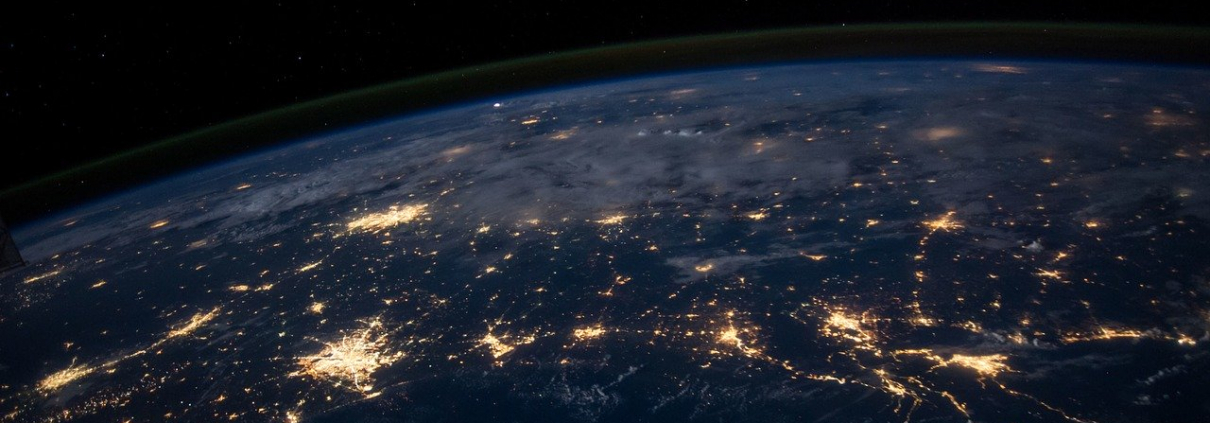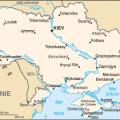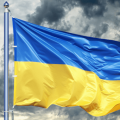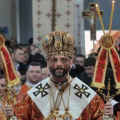Les semaines sociales ukrainiennes s’expriment à la Conférence des Églises d’Europe
Confrontées à la guerre, les églises ukrainiennes ont fait preuve d’un exceptionnel moment d’unité
I am grateful to the Conference of European Churches’ member churches for their support, and for the CEC’s strong statement on the war in Ukraine. It is very important for us.
The theme you have chosen is “Christ’s love moves the world to reconciliation and unity”. I was asked to speak about the war in Ukraine. And war is probably as far from Christ’s love, as one gets. However, the war shows—in a very radical way—the context in which unity and reconciliation can occur. I will start by showing the ways in which various Ukrainian churches have responded to Russian aggression, and then will raise three issues: unity, interconnectedness and reconciliation.
“War is the father of all and king of all; and some he has shown as gods, others men; some he has made slaves, others free”, said Greek philosopher Heraclitus (1). I do not know whether Ukraine will emerge from the war as a slave or free, but Heraclitus is right that war is a game changer. It creates new order and re-structures society. It is a moment when people and churches are called to “choose sides”, and the state of ambiguity becomes intolerable.
Ukrainian Churches’ statements
There have been many gestures of condemnation of war, and solidarity by various church leaders and ecumenical organisations worldwide—some very inspiring and some a bit ambiguous. Here, I would only like to speak about how the churches in Ukraine and Russia have responded. The churches have reacted both jointly and individually.
The All Ukrainian Council of Churches—which unites 16 churches and religious organisations, including Jews and Muslims—issued a statement with words of support for the Ukrainian Armed forces and a blessing to soldiers, asking the international community to help stop the Russian invasion (2). They also wrote a letter to President Putin asking him to stop the war before it is too late (3).
The Metropolitan of the newly created Orthodox Church of Ukraine Epiphany (4) and the Major Archbishop of the Ukrainian Greek Catholic Church Sviatoslav Shevchuk (5) asked everyone to pray for peace, but also talked about the duty of citizens to protect Ukraine. They both asked the international community for their support.
The Protestants too were outspoken in their condemnation of Russia’s aggression. The German Evangelical Lutheran Church of Ukraine insisted that the peace we must pray for, should be “a just peace, which will result in the expulsion of the aggressor from all occupied territories and a fair punishment for the crimes committed” (6). It called those who can serve in the armed forces to join the defence of their country, and invited “brothers and sisters from abroad to provide diplomatic and informational assistance […] and humanitarian aid”. The Ukrainian Union of Evangelical Baptist Churches—which is probably the biggest Protestant denomination in Ukraine—took a more pacifist stance: The Pastor Antonyuk asked communities to pray (he said, our weapon is prayer), but also mentioned the need to provide hospitality to the refugees (7).
Ukrainians and Moscow Patriarchate
Very important is the position taken by the Ukrainian Orthodox Church, which is in unity with the Moscow Patriarchate. Those of you who had the patience to listen to the hour-long speech by President Putin on the 21st of February, which announced the recognition of two separatist republics, will remember that one of the reasons stated for why Russia must intervene in Ukraine, goes as follows: “In Kiev, they are preparing reprisals against the
Ukrainian Orthodox Church of the Moscow Patriarchate” (8). Well, yesterday the head of this church, Metropolitan Onuphry of Kiev, called the Russian invasion “a repetition of the sin of Cain, who out of jealousy killed his own brother. Such a war can have no justification either before God or before people.”
This is a very important statement—it might have arrived a bit late, but better late than never. Since the start of the Ukrainian crisis eight years ago, this Church always insisted on a spiritual and cultural union with Russia, and pretended to be apolitical, neutral. It was often criticised for not taking a position. There was a moment five years ago, when Onuphry refused to honour the soldiers, killed in Eastern Ukraine, saying that he wanted to stay out of the conflict.
Today, I believe that the injustice of what Russia is doing—is so obvious, that the Ukrainian Orthodox Church cannot remain silent. And it is good that they refuse to be exploited by Russian propaganda. They are now saying: you come here to save us from “the Nazis”, but we do not need you. We will fight you.
Metropolitan Onuphry’s confrere in Moscow, Patriarch Kirill came short of condemning the war or even asking to stop it. He limited himself to “call on all parties to the conflict to do everything possible to avoid civilian casualties” (9). Russian aggression was termed “events taking place” and “a tragedy”. A prayer was raised to God to “preserve the Russian, Ukrainian, and other peoples who are spiritually united by our Church”.
I hope the Russian Orthodox Church will find courage to unambiguously call for an end to the Russian invasion of Ukraine.
Why did I focus so much on these declarations? I believe that in those declarations, issued by the churches, in the appeals voiced, one can read their whole ecclesial identity. Written hurriedly, with not much time for editing, they reflect how churches see their own position within society, how deep their inculturation goes, how they see their link to people they work with, how they relate to nationalism and warfare, and how they interpret Scripture. The
moment is really apocalyptic, in the etymological sense of the term: apokalypsis as unveiling, revelation. Churches reveal themselves. So do ecumenical organisations.
Now to three points I wish to make: unity, interconnectedness and reconciliation.
Unity
Ukrainian churches have shown an exceptional moment of unity. This is what war does. This unity might contain risks, but it might lead to reconciliation and unity. We shall see what effect the war will have on the unity of the Ukrainian Orthodox Church with their fellow believers in Russia, and on dialogue between two Orthodox jurisdictions in Ukraine—however, it is reasonable to expect that the influence of war on Ukrainian Orthodoxy will be tremendous.
Of course, one might wonder whether inter-Orthodox unity or inter-Christian relations, which conceive of dialogue as a service to national cohesion, does not transform Christ’s call for unity into a secular slogan, into a war refrain. The raison d’état behind such unity should not be left unquestioned. A church, which reduces its role to the service of a nation and its interest, betrays its universal vocation and eschatological identity, which transcends the
concerns of nation-building (10). Unfortunately, war might not be the best moment for nuance.
We must first survive.
I also expect the war will lead Ukrainian Protestants—especially the Baptists and the Pentecostals—who sometimes tended to live in relative isolation from what was going on in the country—to feel more responsible for society at large and the country’s predicament.
Interconnectedness
We live in a world where everything is interconnected. This is evident when we think of the ecological crisis, Covid-19 pandemic or discussions on sanctions against Russia. As Pope Francis writes in Fratelli Tutti, “we are a global community, all in the same boat, where one person’s problems are the problems of all. […] [N]o one is saved alone; we can only be saved together. […] [W]e are part of one another” (11). In Dostoyevsky’s The Brothers Karamazov, Markel, the brother of starets Zosima says: “every one of us has sinned against all men, and I more than any. […] everyone is really responsible to all men for all men and for everything” (12). When questioned by his mother on how, being so young and innocent, he can be responsible for the world’s evil, Markel answers: “I don’t know how to explain it to you, but I feel it so, painfully even” (13). I suggest this is a profound illustration of the inexplicable, incomprehensible interconnectedness of all. (One could wonder whether Dostoyevsky’s wisdom makes part of the canon of Putin’s “traditional values” he said he is defending in Ukraine, in his message two days ago (14).
What I think is important today, is that the churches and countries of Europe can also feel, “painfully even” their connectedness to what is going on in my country, their responsibility for Ukraine. I hope that churches in Europe, spiritually united with Ukrainian Orthodox, Protestant and Catholic sisters and brothers—may feel compassion and active solidarity—as a body, one member of which is suffering—and not let Ukraine suffer alone. This can involve
reaching out to your churches, governments, businesses asking for pressure to be put on Russia to stop the war, and to support Ukraine in any way possible.
Reconciliation
We do not know how the war will end, but one day it will. And it will not be easy to speak about reconciliation between Ukrainians and Russians. We are not enemies of the Russian people. I have received many words of support from Russian Orthodox clergymen and lay people over the last few days. Many Russians have protested against the war, both in Russia and abroad, some were arrested. It demanded a lot of courage—and they are a credit to the Russian people and an example for Russian religious and political institutions. This Russian resistance to the war—however minimal—is important. It is important for Ukraine—not to hold Russians collectively responsible for what the government is doing. It is important for the people of Russia—to keep some semina verbi, some rays of light in the midst of madness. It is important for everybody—at least for the sake of reconciliation, which, sooner or later will come.
It is ironic that Russians who speak against the war are often the so-called “liberal secularists”
rather than the disciples of Christ. Here Russian philosopher Vladimir Soloviev comes to mind:
In his On the Decline of the Medieval Worldview he says: “if Christians in name have betrayed
the purpose of Christ—and would have ruined it, if only they could have—then why can’t
those who are not Christians in name, and who renounced Christ in word, serve the purpose
of Christ? In the Gospel, we read of two sons; one said, ‘I will go’ and he did not go; the other
said, ‘I will not go’ and he went. […] Which of the two […] did the will of his Father?” (15)
To conclude. Last August, our Institute of Ecumenical Studies in Lviv, launched a project on
ecumenism and peacebuilding— we began studying foreign cases of reconciliation: the
Balkans, Israel/Palestine, Northern Ireland etc. I would like to quote a phrase from the project
description: “One way of looking at the Ukrainian crisis, might be through defamiliarization.
By this we mean looking at the situation, through the lens of other conflicts, which helps to
maintain an epistemic and emotional distance from the domestic situation, allowing us to
contribute to a rational and practical resolution to the conflict”.
Yesterday we woke up in a situation in which de-familiarization does not work anymore, because our families are under threat. No emotional distance is possible, because both the reason and heart call on us to stop this bloodshed. It is a moment when to be super partes means to be with those who suffer and are terrified. It is a moment, when Christ’s love calls us to be united and supportive of those who are being killed for their desire to be free.
Blessed Are the Peacemakers, for They Will Be Called Children of God (Matt 5:9)
Churches Confront War in Ukraine, by Pavlo Smytsnyuk, Institute of Ecumenical Studies, Lviv, Ukraine
Speech at The Conference of European Churches (CEC)
European Regional Pre-Assembly – 25 February 2022
1 Heraclitus, Fragment LXXXIII (D. 53), in Charles H. Kahn, ed. The Art and Thought of Heraclitus: An Edition of the Fragments with Translation and Commentary (Cambridge: Cambridge University Press, 1979), 67.
2 https://vrciro.org.ua/en/statements/uccro-address-regarding-russian-military-aggression-against-ukraine
3 https://vrciro.org.ua/ua/statements/uccro-calls-on-president-putin-to-stop-the-war
4 https://orthodoxtimes.com/metropolitan-of-kyiv-the-truth-is-on-our-side-the-enemy-with-gods-help-will-be-defeatedvideo/
5 http://news.ugcc.ua/en/articles/appeal_of_his_beatitude_sviatoslav_on_outbreak_of_war_95772.html
6 https://nelcu.org.ua/nastav-chas-molytov-za-spravedlyvyj-myr/
7 https://www.baptyst.com/zvernennya-v-antonyuka-do-sluzhyteliv-i-tserkov-u-zv-yazku-z-pochatkom-vijny/
8 http://www.kremlin.ru/events/president/news/67828
9 https://mospat.ru/en/news/89020/
10 Cf. Pantelis Kalaitzidis, « The Temptation of Judas: Church and National Identities, » Greek Orthodox Theological Review 47, no. 1-4 (2002), 357-379
11 Francis, Fratelli Tutti, n. 32.
12 Fyodor Dostoevsky, The Brothers Karamazov, trans. Constance Garnett (London: W. Heinemann, 1951), 297.
13 Dostoevsky, The Brothers Karamazov, 297.
14 http://www.kremlin.ru/events/president/news/67843
15 Vladimir S. Soloviev, “On the Decline of the Medieval Worldview,” in Vladimir S. Soloviev, Freedom, Faith, and Dogma: Essays on Christianity and Judaism, ed. Vladimir Wozniuk (Albany, NY: State University of New York Press, 2008), 168-169.

 Image par Free-Photos de Pixabay
Image par Free-Photos de Pixabay  Wikipedia
Wikipedia
